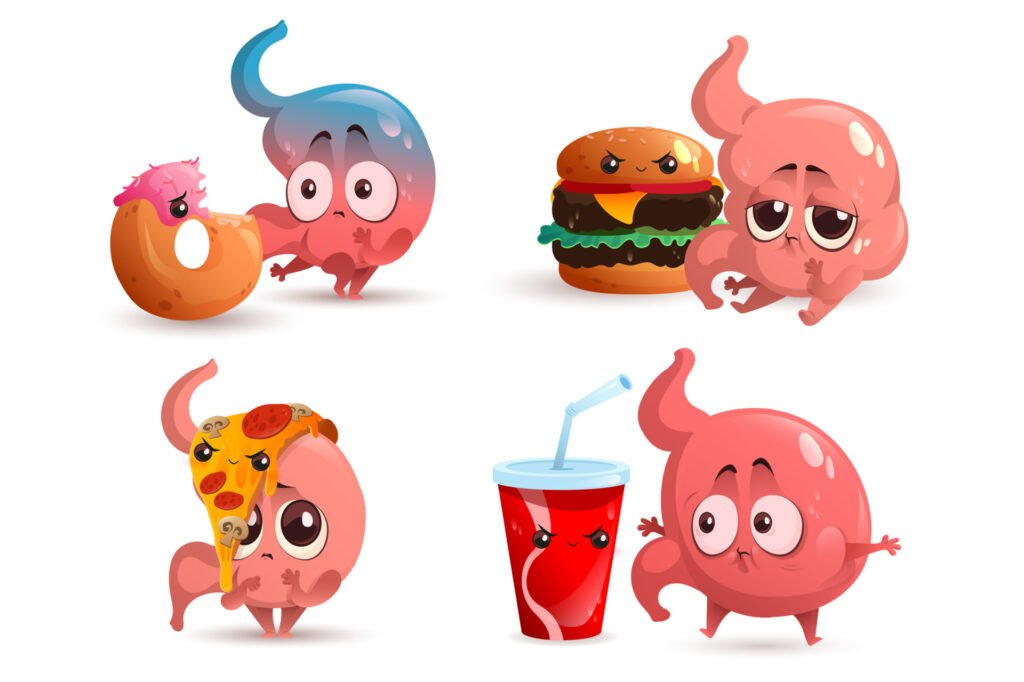A healthy gut is essential for overall well-being. It aids digestion, supports immune function, and even impacts mental health. A balanced gut microbiome is associated with a lower risk of diseases like Alzheimer’s, cancer, and metabolic disorders like obesity. Consuming gut-friendly foods helps maintain a diverse and beneficial microbiome, while certain foods can have adverse effects. Understanding “foods that harm gut health” can guide better dietary choices for improved overall wellness.
Dana Ellis Hunnes, a senior clinical dietitian at UCLA Medical Center and assistant professor at UCLA Fielding School of Public Health, notes that certain foods negatively impact the gut microbiome due to their inflammatory properties, lack of fibre, and effects on insulin. Inflammatory foods—such as highly processed snacks, red meat, and sugary drinks—can disrupt the balance of gut bacteria, potentially leading to digestive disorders like irritable bowel syndrome (IBS) and increased bodily inflammation. Chronic inflammation, in turn, raises the risk of diseases like heart disease.
Foods That Harm Gut Health: What to Avoid
For optimal gut health, it’s essential to maintain a balanced gut microbiome, rich in diverse and beneficial microbes. An imbalance, known as dysbiosis, is linked to numerous health issues. Here are seven foods that harm gut health:
1. Sugary Foods and Drinks
Excessive sugar is among the most harmful to gut health. A 2018 study in Nutrients showed that a diet high in sugar changed the gut microbiome composition, increased gut permeability (leaky gut), and promoted inflammation, all of which increased fatty liver disease risk. Similarly, a 2019 study in “JAMA Internal Medicine” linked daily sugary soft drink consumption with a higher mortality rate from digestive diseases compared to occasional consumption.
2. Sugar Substitutes
While it may seem healthier, artificial sweeteners can also harm the gut. According to registered dietitian Lisa Jones, artificial sweeteners can disrupt gut flora. Research in the International Journal of Molecular Sciences (2021) associated sweeteners like aspartame, saccharin, and sucralose with harmful bacteria, such as E. coli and E. faecalis. Moreover, a 2018 study in Molecules found that artificial sweeteners adversely affected gut microbiome activity. The WHO classified aspartame as possibly carcinogenic in 2023, suggesting caution in consumption.
3. Alcoholic Beverages
The 2020-2025 Dietary Guidelines for Americans advise moderate alcohol consumption—up to two drinks per day for men and one for women. However, excessive drinking disrupts the gut microbiome and may lead to dysbiosis, according to a 2020 Gut Microbes study.
4. Fried Foods
High in saturated fats, fried foods are tough on the digestive system. “Fried foods, typically prepared with oils rich in trans fats, can cause gut discomfort,” says Jones. Common oils, like palm and coconut, used in frying, contribute to symptoms such as diarrhoea, gas, and stomach pain.
5. Red Meat
While popular on a barbecue, red meats like burgers, sausages, and hot dogs can damage gut health. Dietitian Kim Kulp explains that gut microbes produce enzymes from red meat that promote inflammation. Additionally, Cleveland Clinic’s Stacy Cavagnaro highlights that L-carnitine, found in red meat, can alter the gut microbiome, increasing heart disease risk. Kulp advises limiting red meat to prevent inflammation and decrease the risk of colon cancer and heart disease.
6. Salty Foods
Cutting back on salt benefits your gut microbiome. High-sodium diets can cause bloating, and fluid retention, and disrupt protein digestion, notes Dr. Edward Salko of Personalabs. A 2019 review in the “American Journal of Physiology” found that high-sodium diets promoted inflammation and altered gut microbiome function, potentially contributing to hypertension.
7. Ultra-Processed Foods
Many processed foods contain harmful additives and excessive salt. Dietitian Stacy Cavagnaro cautions that ultra-processed foods are often low in fibre, an essential nutrient for gut health. Common ultra-processed foods include lunch meats, cakes, cookies, and soft drinks.
Moderation is Key
Anastasia Gialouris, a registered dietitian, recommends a balanced approach: “While it’s best to avoid processed foods, occasional indulgence is fine if healthy habits are maintained consistently.” Avoid quick fixes or detox products marketed to improve gut health. Instead, focus on a balanced diet that supports long-term gut health.
Summary: Foods That Harm Gut Health
– Sugary foods and drinks
– Sugar substitutes
– Alcohol
– Fried foods
– Red meat
– Salty foods
– Ultra-processed foods



